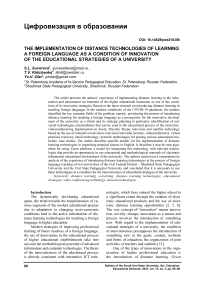The implementation of distance technologies of learning a foreign language as a condition of innovation of the educational strategies of a university
Автор: Suvorova S.L., Khilchenko T.V., Olar Yu.V.
Рубрика: Цифровизация в образовании
Статья в выпуске: 3 т.13, 2021 года.
Бесплатный доступ
The article presents the authors' experience of implementing distance learning in the information and educational environment of the higher educational institution as one of the conditions of its innovative strategies. Based on the latest research on introducing distance learning in teaching foreign languages in the modern conditions of the COVID-19 pandemic, the authors identified the key semantic fields of the problem, namely: positioning the process of introducing distance learning for teaching a foreign language as a prerequisite for the innovative development of the university as a whole and its strategic planning in particular; identification of universal technologies and platforms that can be used in the educational process of the university: videoconferencing implemented on Zoom, Discord, Skype; television and satellite technology based on the use of interactive television: television and radio lectures, videoconferences, virtual practical exercises; email technology; network technologies for posting various educational materials; case studies. The article describes specific models for the implementation of distance learning technologies in organizing practical classes in English. It describes a step-by-step algorithm for using Zoom platform, a model for integrating this technology with network technologies that provide an opportunity to use educational and methodological materials of electronic information educational environment of the university. The authors carried out a comprehensive analysis of the experience of introducing distance learning technologies in the process of foreign language teaching of two universities of the Ural Federal District - Shadrinsk State Pedagogical University and the Ural State Pedagogical University and concluded that it is necessary to use these technologies as a condition for the innovativeness of educational strategies of the university.
Distance learning, e-learning, distance learning technologies, educational strategies, video conferencing technology, network technologies
Короткий адрес: https://sciup.org/147235261
IDR: 147235261 | DOI: 10.14529/ped210308
Список литературы The implementation of distance technologies of learning a foreign language as a condition of innovation of the educational strategies of a university
- Abdurazakov M.M., Tsvetkova O.N., Mironova I.V. [Presentation of Information and Educational Environment in the Educational Cyberspace]. Historical and Social Educational Ideas, 2016, vol. 8, no. 6-1, pp. 167-172. (in Russ.) DOI: 10.177748/2075-9908-2016-8-6/1-167-172
- Antony Stella, A. Gnanam. Quality assurance in distance education: The challenges to be addressed. The International Journal of Higher Education Research, 2004, no. 47, pp. 143-160. DOI: 10.1023/B:HIGH.0000016420.17251.5c
- Dikikh E.R. Podgotovka studentov baka-lavriata k professional 'noy pedagogicheskoy deyatel'nosti v informatsionno-obrazovatel'nom prostranstve. Diss. kand. ped. nauk [Preparation of Undergraduate Students for Professional Teaching Activities in the Information and Educational Environment. Diss. Cand. (Pedagogy)]. Omsk, 2014. 193 p.
- Frolova E., Ryabova T., Rogach O. Digital Technologies in Education: Problems and Prospects for "Moscow Electronic School" Project Implementation. European Journal of Contemporary Education, 2019, no. 8 (4), pp. 779-789. DOI: 10.13187/ejced.2019.4.779
- Garrison D.R. Theoretical challenges for distance education in the 21st century: A shift from structural to transactional issues. The International Review of Research in Open and Distance Learning, 2000, no. 1 (1), pp. 1-17. DOI: 10.19173/irrodl.v1i1.2
- Gruzina Yu., Ponomareva M., Firsova I., Mel'nichuk M. Present-Day Challenges to an Education System. European Journal of Contemporary Education, 2020, no. 9 (4), pp. 773-785. DOI: 10.13187-2020.4.73
- Guidelines on Distance Education during COVID-19. Burnaby: COL. Commonwealth of Learning, 2020. 15 p.
- Holmberg B. Guided Didactic Conversation in Distance Education. Distance Education: International Perspectives. London, Croom Helm, 1983, pp. 114-122. DOI: 10.4324/ 9781003033950-10
- Jillene Grover Seiver, Alicia Troja. Satisfaction and success in online learning as a function of the needs for affiliation, autonomy, and mastery. Distance Education, 2014, no. 35 (1), pp. 90-105. DOI: 10.1080/01587919.2014. 891427
- Karpenko M.P. [The Future Technologies - to the Future Education]. Obozrevatel' -Observer, 1999, vol. 6, pp. 69-72. (in Russ.)
- Kirko V.I., Pack N.I., Malakhova E.V. Education for the Future: New Strategies of Distance Education for the Universities of Eastern Siberia. Turkish Online Journal of Distance Education, 2014, vol. 15 (1), pp. 23-32. DOI: 10.17718/tojde.48839
- Klarin M.V. Innovatsii v obrazovanii: Metafory i Modeli: Analiz zarubezhnogo opyta [Innovations in Education: Metaphors and Models: Foreign Experience Analysis]. Moscow, Nauka Publ., 1997. 398 p.
- Monaliza E.O. Haddad, Naura, S.C. Ferreira, Adriano, A. Faria. The Use of Educational Technologies in Distance Education -Enabling the Appropriation of Teaching and Learning Process. Open Journal of Social Sciences, 2014, vol. 2 (01), pp. 54-58. DOI: 10.4236/jss.2014.21006
- Ob obrazovanii v Rossijskoy Federatsii: Federal'nyy zakon No. 273-FZ ot 29 dekabrya 2012 g. [On the Education in the Russian Federation: The Federal Law No. 273-FZ from December 29, 2012]. Available at: https://base. garant.ru/77687681/7a58987b486424ad79b62 aa427dab1df/ (accessed: 11.12.2020).
- Osipova L.B., Goreva O.M. Distan-cionnoe obuchenie v vuze: modeli i tehnologii [Distance Education in Higher Educational Establishment] . Sovremennye problem nauki i obra-zovanija, 2014, no. 5, pp. 173-179.
- Paloff R.M., Pratt R. The virtual student. A profile and guide to working with online learners. Jos-sey-Bass, San Francisco, 2001. 216 p.
- Sangeeta Sharma, Arpan Bumb. The Challenges Faced in Technology-Driven Classes During COVID-19. International Journal of Distance Education Technologies (IJDET), Maiga Chang (Athabasca University, Canada), 2020, no. 19 (1), pp. 66-88. DOI: 10.4236/jss. 2014.21006
- Turanova L.M., Styugin A.A. Aspects of Applying Distance Education Technologies in the System of University Students Training. Journal of Siberian Federal University. Humanities & Social Sciences, 2015, no. 3, pp. 468-475. DOI: 10.17516/1997-1370-2015-8-3-468-475


